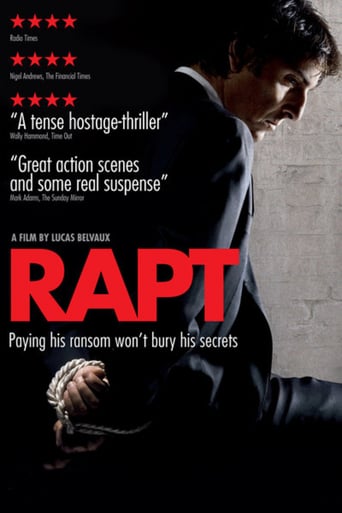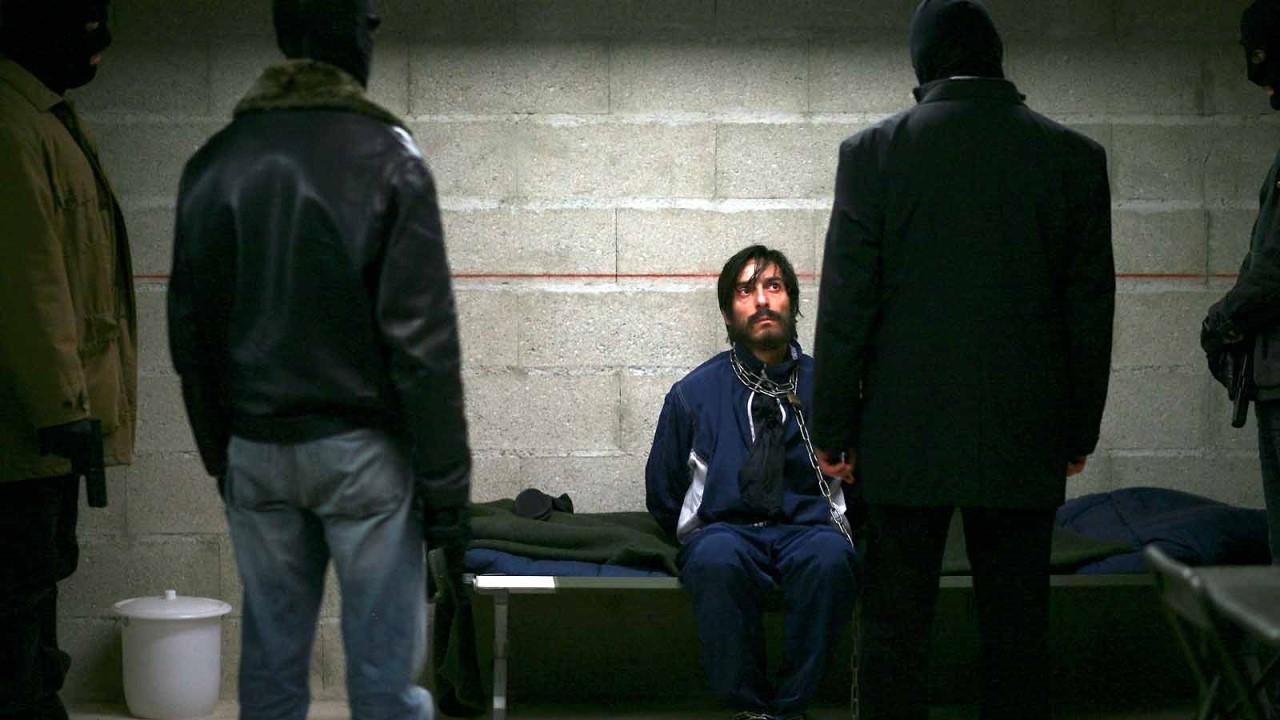Tim Bishop
In my opinion this doesn't work as a film but would have been better as a mini series. It spends a lot of time developing interesting characters but hardly any of these characters motivations are explored in any great depth. This means it should have been a lot shorter with lots of action and limited character building, or longer with the characters fully explored. For instance his wife plays a major role but when he is released we see her a couple of times and then he is talking of divorce. Or we could have seen more of the back-stabbing that went on in the board room from his so called 'trusted' assistant. But surely we could have learnt more about the kidnappers, we weren't even let in to see who ran the crew never mind the chance to see their discussions over decision making. Part of me thinks that the director intended a certain amount of anonymity in the kidnappers, in my opinion it just doesn't work in this case making them banal rather than terrifying. I remember hearing once that a good story teller 'shows instead of tells' I think the director was trying this but it just didn't work with a film of this length with so many characters.
paul2001sw-1
'RAPT' is a nasty and effective French thriller, although the nastiest moment comes early on and is subsequently not trumped. A rather unlikeable millionaire businessman is kidnapped; the film follows both his ordeal, and also the response of his family and associates. There are some thriller conventions here, particularly the slightly unbelievable professionalism of the kidnappers, but it's an effective movie nonetheless: tense and fast-moving, but also an interesting exploration of what might happen when someone loses all control of the narrative of their own life (and to wit, someone who has been used to doing exactly what he wants). I'm not sure there's any moral here, beyond the general unpleasantness of mankind (and more particularly, the rich), but the film not only entertains, but does so in an intelligent and provocative way.
rdescartes101
The players, the family, the business men, the politicians, the kidnappers, the police, the solicitor and of course, the victim. All with agendas, all seeking resolution and some seeking personal gain. Was the kidnapping the sole motivation? Was the avarice and greed of the business associates a prime motive? Were the family really the ideal family unit?Ans, none of the questions were answered. The wife's disdain for the apartment, the police motivation for showing it to her, all contribute to an ending that seeks more answers.The collapse of the kidnapping, Stan's business position, the police case and the kidnappers' demands. If it was his own doing would the "calypso" note have appeared? For the French, the affairs of the heart are common place. the younger daughter's manner through out the episode. Did the family love the man or the riches and life style? The complex but seemingly simple plot lines gave way to a multitude of questions and who would most benefit from the escapade? Who was responsible?
Chris Knipp
The Belgian-born Lucas Belvaux, who began his career by running away to Paris and becoming an actor, has over 45 TV and film acting credits and is in the cast most recently of Robert Guédiguian's Army of Crime. As a director he's best known for his "Trilogy," three films with interlocking stories and characters, each filmed in a different genre. Cavale/On the Run is a 'policier,' or thriller; 'Un couple épatant'/'A Terrific Couple' is a comedy; 'Après la vie'/'After Life' is a melodrama. For this now-famous project Belvaux won the Prix Louis-Delluc in 2003.'Rapt' is a thriller, and an elegant-looking and beautifully made one that is both breathtaking and thought-provoking. It stars a riveting Yvan Attal, a hot actor this year who also stars in another high-energy 2010 "Rendez-Vous with French Cinema" film, Cédric Kahn's amour fou tale, 'Regrets.' Through the course of 'Rapt,' one is drawn into a closer and closer identification with Attal's character and his complex, disturbing, very modern fate.The English word 'rapt' of the title, used for this French-language film, carries with it a hint of shock. It's meant in its basic sense of transported, carried away. It sounds like "raped." It's more arresting and harsh than the French word for kidnapping, 'enlevé.' The subject is just that, the kidnapping of a rich and powerful corporate head so high up he deals directly with officials of the French government on a day-to-day basis. At first the movie promises to be a conventional thriller: rich guy held for ransom, bargaining, tension, threats -- and the diminutive, swarthy Attal doesn't seem totally convincing as Stanislas Graff, a mover and shaker of the French establishment. What's he running around about? The rapid sequence of opening scenes also fails to define fully who exactly Graff is, whether government or business. His being constantly called "Président" throughout may confuse us as American viewers. But it doesn't hurt the film too much for his identity to be somewhat generic.This is because once Graff is captured things become much more convincing, and (spoiler!) after he's released, things become interesting and surprising. 'Rapt' is another stunning example, like Guillaume Canet's 2006 star-studded version of the Harlen Coben novel 'Tell No One,' that the French now can do American thrillers better than Hollywood, giving a spin to them that's both classic and fresh. Belvaux's ingenious film succeeds very economically -- without money wasted on explosions or special effects -- both as an intense nail-biter and as a tale that reaches for the philosophical and heroic. He's very high up, very powerful, but he's also someone those closest to him hardly know. The kidnapping of Stnaslas Graff is seen as a primal trauma that alters his life and his family's, company's, perhaps his culture's equilibrium irrevocably. Nothing can be done to go back, and nothing can ever be the same in Graff's world again.Graff's chauffeur-driven car is stopped, he's carried away, and he's very rapidly hidden away, terrified, humiliated, hurt, and mutilated. A finger is sent off to prove the kidnappers really have him. The confinement goes through stages. At first he's continually masked and not allowed to look in the face of the (also masked) guardians, and he must hover in a tiny tent inside some vast abandoned prison complex or factory. Later he's moved elsewhere, fed properly, talked to pleasantly, allowed to move around in a cell, and his chief kidnapper, still masked, lets him look. Meanwhile frantic activity goes on in Paris. The ransom demanded is 50 million euros. His family can't access his money. His company agrees to advance a sum, no more then 20 million. Later it goes higher.The police enter the picture massively, but against the wishes of the company and Graff's attorney, an elegant black man, Maître Walser (Alex Descas of '35 Shots of Rum,' also in 'The Limits of Control'). The rest is a story of warring forces and shifting loyalties, with female family members (Anne Consigny, Françoise Fabian, Sarah Messens as loyal mother and reproachful wife and daughter) tested by revelations of Graff's secret life, his gambling debuts at poker and the casino, his mistresses and posh glass hideaway above Paris. All this is now published in the magazines and tabloids. It's even suggested by people in the company and the police that Graff could have contrived the kidnapping to settle his debts. His influence at the company is seriously dented, and during the two months of his confinement, the interim CEO gains power. When it's all over, Graff has only his red setter to love him and to love. And yet there is a rebirth. But it may be illusory.'Rapt' carries its story beyond the conventional climax into a kind of heroic struggle for identity and power, a drama of the essential loneliness of man and the dominance of image in the modern world. Some of the speeches in the last segment might come from a contemporary version of Corneille or Racine. Attal is remarkable, suffering, Christlike in confinement, also resembling the death mask of Marcel Proust; then reborn, fiery, but surrounded by confining police protectors and intimate betrayers of trust so his freedom seems anything but that and the real brutality may be in release, the real prisons wealth, power, and fame. But it's not that simple: Rapt isn't preachy or tendentious; it supplies you with a damn good time but leaves you pondering. It may be a better film than it seems, or even than its makers realized. In his famous "Trilogy" Belvaux played with genres. Here he uses a single genre to transcend genre. Like Cantet's Tell No One, this plays very well as a mainstream film, but is much more.'Rapt' opened in Paris November 18, 2009 to very good reviews; shown at the Rendez-Vous with French Cinema at Walter Reade Theater and IFC Center, New York, March 2010.


 AD
AD



